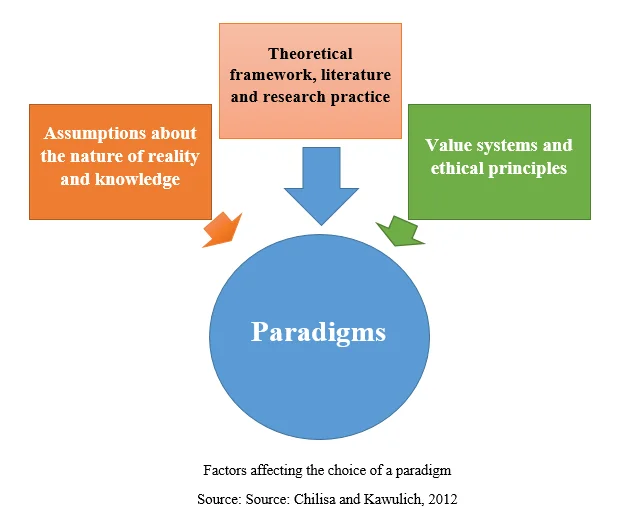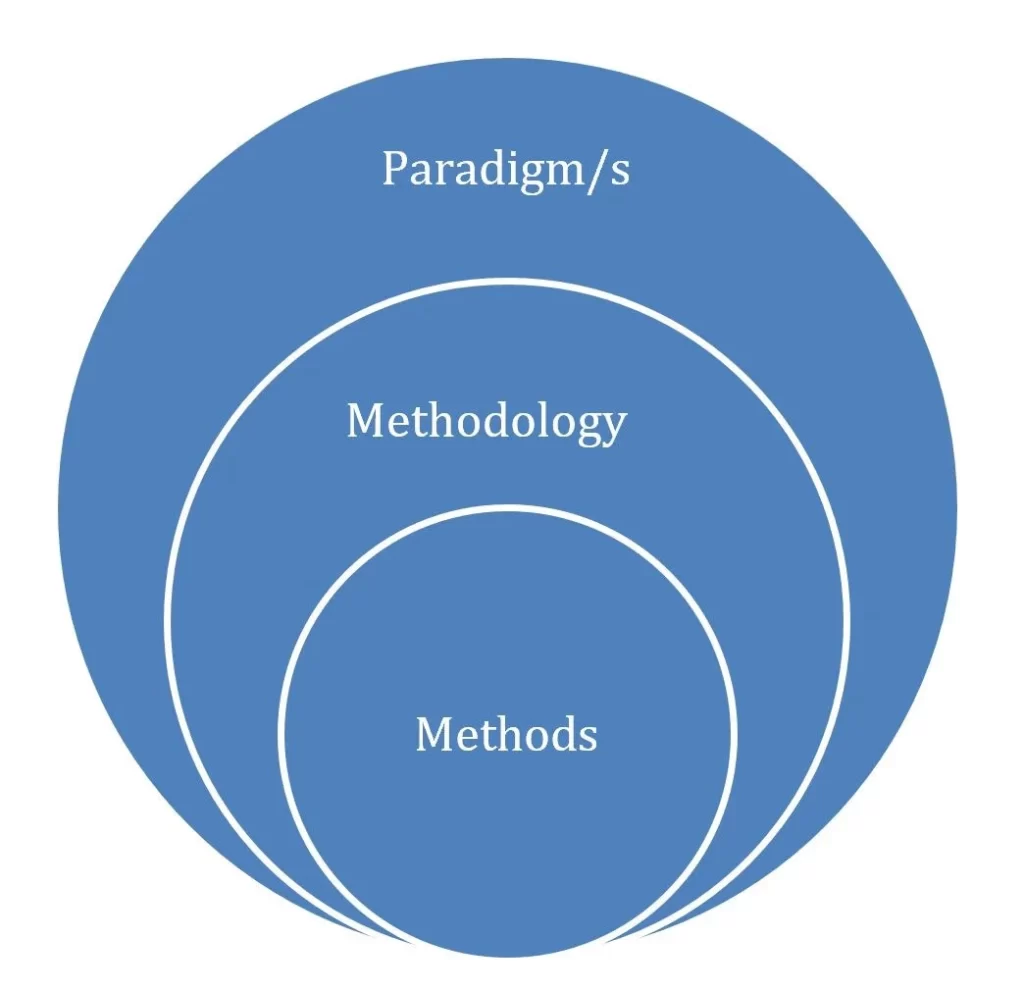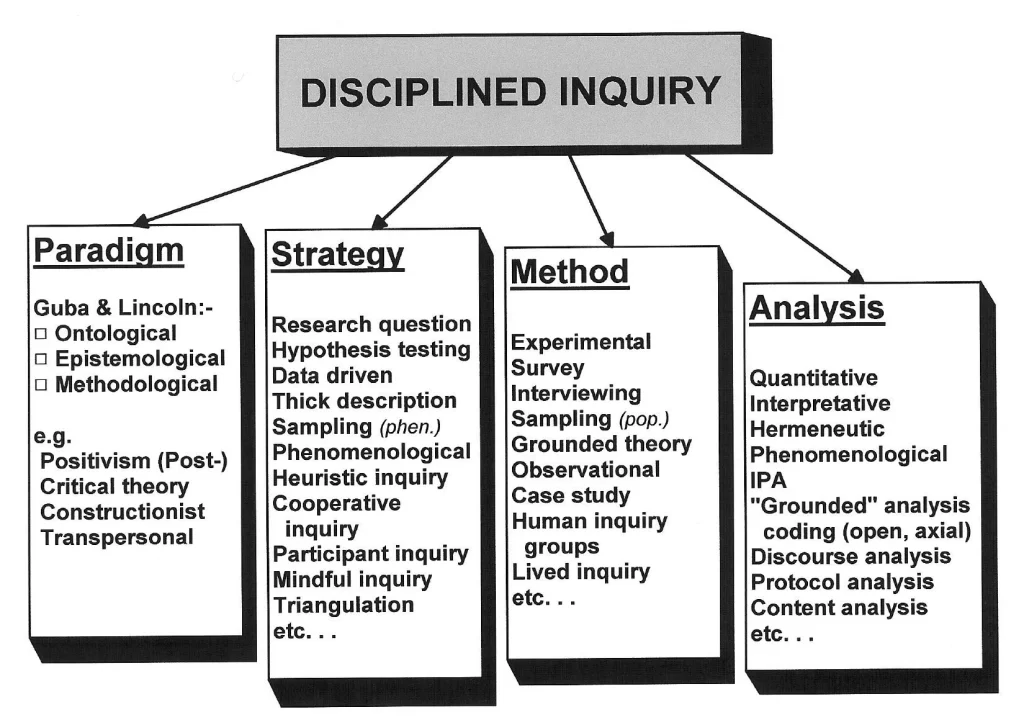Positivism and Post-Positivism and its Relevance in Dissertation Writing
Published by at September 21st, 2021 , Revised On June 14, 2024
Positivism and Post-Positivism – Research Paradigms and Underlying Philosophical Assumptions
Both positivism and post-positivism are two different research paradigms, with different philosophical beliefs surrounding them. So, before diving further into what positivism and post-positivism themselves are, it’s essential and quite inevitable first to understand what paradigms and philosophical assumptions about those paradigms might be.
It’s important to understand these things for your dissertation because these things actually determine what research methods you will use or have used; how you can justify their use in your dissertation writing; which sampling and data collection techniques you used and why, etc.
Research Paradigm
A ‘paradigm’ is a ‘perspective.’ It can be any idea or point-of-view of thinking about something at a given time, within a given discipline. For instance, one might say that psychology has its paradigms, whereas mathematics has its own.
However, in research (natural/social sciences), instead of simply saying ‘perspective,’ a more formal term, ‘paradigm,’ is used. It represents any of the underlying beliefs about a given subject. Those beliefs are said to be the standard, the standard behind the thinking of a certain aspect in that subject area.
That means everything in the world, researchers and laymen alike, view that aspect in the same way. The only difference lies in which side of the aspect a certain individual holds truer than the others (subjectivity).
Mertens defined research paradigm as “A paradigm is a way of looking at the world. It is composed of certain philosophical assumptions that guide and direct thinking and action. Trying to categorize all educational and psychological research into a few paradigms is a complex and, perhaps, impossible task.”
There are four main types of research paradigms used today:
- Post-Positivism
- Constructivism
- Transformativism
- Pragmatism
In this guide, only positivism and post-positivism will be discussed.
Key point to remember: Paradigms are the philosophical ‘lens’, whereas philosophical assumptions are the underlying ways to view the world and reality through that lens.
Underlying Philosophical Assumptions
Simply knowing which paradigm to follow in research is not enough. A researcher also needs to narrow down and specify what he/she believes to be true or essential. These ‘philosophical assumptions’ are grouped into four main types:
- Ontology
Greek word ‘logos’ means ‘theory or word.’ The prefix of ‘ontology’ is a derivative of the word ‘ousia,’ which means ‘being’ or ‘real thing.’ Ontology is not itself reality; it is the theory of, or words about, reality. Ontology aims to answer ‘what is most real, what is most basic, and what is to be accounted for in terms of what.’ Axiological assumptions further take two forms:
- Materialism/ metaphysical realism: Material objects exist in the external world ‘independently of the minds of perceivers’ (Musgrave, 1993, p. 122), or the external world exists independent of human minds. In other words, the reality is out there. The roots of this thought are that everything in the world can be reduced to a set of physical properties—that ultimately, everything is matters.
- Immaterialism/ metaphysical idealism: Everything is mental or an aspect of, or dependent on, the mind/ mental (Alston, 2002). This ontological position is rooted in the work of Berkeley (1686-1753), who believed objects in the external world are nothing but collections of ideas and the only kinds of things in the world are minds and thoughts. Berkeley shifts our focus to sense data and ideas.
So, what there is and what we can know are collections of ideas and appearances. An idealist thinker believes that ‘what we call reality is something which depends for its existence upon our minds. Common examples include depression, God, challenges, global warming, etc. Even trees and rocks and their properties are mind-dependent entities.
Point to ponder: Think of the following questions to understand metaphysics better:
- Does the law exist?
- Is morality the essence of human beings?
- Is truth/ reality contextual and historical?
- Does slavery exist today?
- Does education emancipate people?
- Epistemology
The prefix of ‘epistemology’ comes from ‘episteme,’ for knowledge. Epistemology is not itself knowledge or interpretations; it is the theory of, or words about, knowledge and interpretations; where does the knowledge ‘come from,’ its sources. One such source assumed by epistemology is perceptions.
According to epistemological assumptions/beliefs, perceptions are psychologically held premises that are considered true. They are as real as are material substances. Perceptions can be investigated through questionnaires, for instance.
- Axiology
Ethics are an integral part of the research, no matter the discipline. Axiological assumptions deal with the nature of ethical behaviour, as Mertens termed it. They are based on the following ethical considerations of research:
- All research and researchers should respect the privacy of participants in the study and make informed to ensure that privacy is maintained.
- Consent from participants to disclose personal information should be given.
- Minimize harm (beneficence) and ensure justice and equal opportunity for those involved in the research process.
- Participants’ awareness should be raised about some important issue they aren’t already aware of.
- Everyone’s views should be represented in a balanced form.
- Cultural norms should be preserved during every step of the research process.
- There should be an increase in knowledge for the research while pursuing desired research goals.
Remember: Ontology deals with the nature of reality/truth. It tries to answer the big questions, such as ‘what is real,’ ‘what is most basic’ and ‘what is what.’ However, epistemology is concerned more about the nature of knowledge and its sources (what is known) rather than truth (what’s out there). Axiology is related to research ethics and behavior.
Note: All four paradigms have their philosophical assumptions. For instance, constructivism has its own axiological, epistemological, and ontological assumptions. They are different from those of pragmatism, for instance.
- Methodology
Often, it’s thought that method and methodology are the same things. However, this is a common misconception among research and non-research-related areas. A method is a way something. But the overall, general approach to why a certain method is used over another is methodology.
Key take-away: Methods are the how, and methodology is the why behind knowledge claims.
For instance, a day in the summer can be described in two ways. One way would be to describe it as ‘It was very humid today.’ Another way could be, ‘It was 46 degrees Celsius with a precipitation index of today.’ The first method used descriptive words, so the methodology is quantitative. However, the second method uses numbers, facts, figures, etc., and is therefore quantitative.
Similarly, in research, either quantitative or qualitative methods are used. The part which is quantitative or qualitative is the methodology behind those methods. The four research paradigms can make use of either or mix and match to create a third methodology, the mixed-methods approach.
Other examples include:
- There are cooking methods, NOT methodologies.
- There are stitching methods, NOT methodologies.
- There are teaching methods, NOT methodologies.
- There are research methods and methodologies.
Positivism
The one central paradigm that was very dominant in early 19th century educational and psychological researches was positivism. It’s influenced by the rational and empiricist ‘positive’ philosophies of scientists and philosophers like Auguste Comte, Immanuel Kant, Aristotle, Francis Bacon, and John Locke, etc.
However, much of positivism is credited back to Comte, who, in 1824, wrote, “I believe that I shall succeed in having it recognized . . . that there are laws as well-defined for the development of the human species as for the fall of a stone.”
In Comte’s view, the ‘positive’ stage of human knowledge is reached when everyone starts to rely on empirical data, logic, reason, and scientific laws to explain things happening around them. The scientific method, according to positivists, is the “surest
way to produce effective knowledge,” as Frankel writes.
The underlying beliefs of positivism claim that:
- The social world—the world containing human behaviour, emotions, cultures, etc.—can be studied in the same way as the natural world—the world consisting of animals, plants, diseases, etc.
- The social world can be studied in terms of a cause-and-effect relationship, rather than a value system where one thought, culture, language, or anything else is considered superior over another. The cause-and-effect relationship is more rationalistic and objective than the subjective value system. And everyone knows how science prefers objectivity over subjectivity.
- Using the scientific method—which consists of hypothesis, experimentation, theories, and laws, etc.—allows accurate measurement of what can be observed. This measurement can then be used to create laws that describe constant, recurring relationships between variables in the world.
Positivists believe that “scientific knowledge is utterly objective and that only scientific knowledge is valid, certain and accurate” (Crotty, 1998, p. 29).
Criticism on Positivism
Just like everything else, this objective, the scientific method, has its drawbacks too. It cannot be applied to study something like human behaviour, something that contains abstractions like happiness, anger, etc. Such abstractions cannot be measured like; for instance, the weather can be measured using a barometer.
This is where the need for post-positivism comes in.
Philosophical Assumptions of Positivism
Furthermore, the following are the philosophical assumptions underlying the positivist paradigm:
| Philosophical Assumption | Positivism |
|---|---|
| Axiology (nature of research ethics) | Privacy can be overlooked for the sake of meeting research goals; informed consent from research participants isn’t that important if the stakes are too high; harming a few to save many is okay; equal opportunities for everyone involved cannot always be provided. |
| Ontology (nature of reality) | There is only one reality out there; all of it is knowable and measurable in some way. |
| Epistemology (nature of knowledge and relation between knower and the known) | Objectivity over subjectivity; the researcher should observe in a non-emotional, objective way; knowledge is independent of the knower. |
| Methodology (nature of enquiry) | Quantitative/mixed-methods |
Interesting read: The Vienna Circle of Logical Positivism was developed after the influence of positivism spread quickly in scientific circles. Using the philosophy of measuring only the observable, some took it too far and argued that on this line of thought, only the observable, measurable, and visible exists. And that things like soul, goodness, and even God don’t exist since they can’t be seen nor measured.
This goal was to deny the existence of all such metaphysical concepts so that science, and not religion plus science, become the public’s favourite.
Post-Positivism
The second point of positivism implies that only that which can be observed can be studied, for instance, the rain. Since it’s observable, its intensity can be measured using different scientific instruments.
And the third belief of positivism implies that laws can be generalized to explain other, similarly occurring behaviours and phenomena.
These two beliefs—observable and generalizable phenomenon—came to be highly criticized and rejected by post-positivists, for they believed that:
- When it comes to social sciences and studying social behaviour, the same things like meaning, absolute truth, or laws can’t exist as rigidly as they exist in the natural world. For instance, Foucault argues how all the knowledge and truth in the world are products of power, history, social relationships, etc., and therefore, can’t be discovered nor measured like positivists believe.
- All naturally present languages—such as art or some other non-mathematical language—contain unclear terms, terms that tend to change over time due to the impact of human actions and interventions. As such, these languages can’t be measured like the humidity level in a day can measure, for instance.
Post-positivism, therefore, has had a great impact on educational research. For it answers such abstract questions which positivism can’t. In other words, post-positivism starts where positivism ends.
Point to ponder: What do you think? Can ‘truth’ really be measured, verified, or calculated? Or it is indeed a product of history, time, and social interactions?
Philosophical Assumptions of Post-Positivism
Following are the philosophical assumptions underlying the post-positivist paradigm:
| Philosophical Assumption | Post-Positivism |
|---|---|
| Axiology (nature of research ethics) | The privacy should be always respected; informed consent from research participants; harm should always be minimized (beneficence); equal opportunities for everyone involved. |
| Ontology (nature of reality) | There is only one absolute reality out there; knowable but to a limited extent. |
| Epistemology (nature of knowledge and relation between knower and the known) | Objectivity over subjectivity; the researcher should observe in a non-emotional, objective way; knowledge is independent of the knower. |
| Methodology (nature of inquiry) | Quantitative (mainly, but can be qualitative/mixed-methods) |
Criticism on Post-Positivism
The main drawback of post-positivism is that many terms, concepts, and ideas, etc are expressed in vague, complicated, highly philosophical language. Such language might not always be understood by everyone. Contrary to this, the standard language and figures, etc used in scientific research of positivism are generalized such that everyone, everywhere, understands it.
Positivism and Post-Positivism in Dissertation Writing
Research paradigms are the major ‘heads’ that will specify the smaller methods your research will take in your dissertation. This simple concept can better be understood from the following illustration:
Both these ideas coupled with the research paradigms are approaches to research. Use of one over the other needs to be justified within your dissertation, the same as the rest of your methodological choices must be.
Writing about the research paradigm you adopted prior to conducting your dissertational study is a part of the methodology chapter. Did you review collected sample data from an ontological perspective? Why or why not? Was post-positivism a part of how you interpreted your data or intend to? Why not positivism?
All such justifications need to be mentioned within your methodology section of the dissertation.
Methodological approaches need to be specified within this section of a dissertation. Furthermore, this specification helps narrow down and relate back and forward to key research concepts, depicted below:
Conclusion
Positivism and post-positivism are both very important research paradigms. They have their underlying philosophical assumptions i.e., axiological, epistemological, ontological, and methodological beliefs. Positivism deals with objectivity in scientific research.
It revolves around the belief that only that which is observable directly is measurable.
Contrary to this, post-positivism believes that not everything can be observed directly, such as human behaviour. However, it doesn’t deny the possibility of measuring such abstract concepts either.
FAQs about Positivism and Post-Positivism
There are different ways or ‘lenses’ of looking at the reality that exists out there. Any research aims to study some specific aspect of that reality, whether it’s a social phenomenon, a disease, a faulty judicial system, etc. As such, a researcher must decide, from which lens do I look at this problem?
To answer that question, a researcher must select one of the four main research paradigms, out of which positivism and post-positivism are only two.
Qualitative and quantitative methodologies are part of the research paradigms, positivism, and post-positivism. Either can be used in positivism and post-positivism, as well as a mixed-methodology approach, depending on the kind of research problem and its results.









